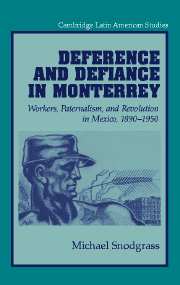Book contents
- Frontmatter
- Contents
- Acknowledgments
- Introduction
- 1 Porfirian Progress in “Mexico's Chicago”
- 2 Revolution Comes to Monterrey
- 3 Work, Gender, and Paternalism at the Cuauhtémoc Brewery
- 4 Making Steel and Forging Men at the Fundidora
- 5 The Democratic Principles of Our Revolution: Labor Movements and Labor Law in the 1920s
- 6 Every Class Has Its Leaders: ASARCO, The Great Depression, and Popular Protest in Monterrey
- 7 Stay with the Company or Go with the Reds
- 8 State Your Position!: Conservatives, Communists, and Cardenismo
- 9 The Quotas of Power: Organized Labor and the Politics of Consensus
- 10 The Persistence of Paternalism
- 11 The Institutionalized Revolution
- Select Bibliography of Primary Sources
- Index
3 - Work, Gender, and Paternalism at the Cuauhtémoc Brewery
Published online by Cambridge University Press: 19 August 2009
- Frontmatter
- Contents
- Acknowledgments
- Introduction
- 1 Porfirian Progress in “Mexico's Chicago”
- 2 Revolution Comes to Monterrey
- 3 Work, Gender, and Paternalism at the Cuauhtémoc Brewery
- 4 Making Steel and Forging Men at the Fundidora
- 5 The Democratic Principles of Our Revolution: Labor Movements and Labor Law in the 1920s
- 6 Every Class Has Its Leaders: ASARCO, The Great Depression, and Popular Protest in Monterrey
- 7 Stay with the Company or Go with the Reds
- 8 State Your Position!: Conservatives, Communists, and Cardenismo
- 9 The Quotas of Power: Organized Labor and the Politics of Consensus
- 10 The Persistence of Paternalism
- 11 The Institutionalized Revolution
- Select Bibliography of Primary Sources
- Index
Summary
Since the 1920s, Monterrey's captains of industry have been renowned for their systems of company paternalism. Be they hagiographic or critical, histories of these industrialists largely assume that paternalism produced disciplined, quiescent, and malleable labor forces. These studies largely define paternalism in terms of the nonwage incentives proffered to workers. But those welfare benefits underpinned a specific system of social relations between workers and their employers – workplace encounters punctuated by benevolence, patriarchy, and personalism. While other employers in Mexico offered nonwage benefits to their workers, none did so with greater enthusiasm, resources, and self-promotional panache than the pillars of regiomontano industry. Monterrey's largest companies offered the incentives for all the usual reasons: to retain workers, to foster deference and loyalty, and to prevent the intrusion of government and organized labor into their factories. They employed crafty lawyers and outright intimidation to combat unionism as well. And they publicized their benevolence to purchase political capital and enhance their civic prestige. But the industrialists also shared, judging by their words and deeds, a sincere and heartfelt concern for their workers' well-being. Moreover, decades later, the workers who retired from these companies continued to express their own reverential gratitude toward Monterrey's pioneers of paternalism.
The systems of paternalism practiced in Monterrey paralleled those introduced elsewhere in the industrial world. But the Monterrey elite devised their managerial strategies within a unique context – that of revolutionary Mexico.
- Type
- Chapter
- Information
- Deference and Defiance in MonterreyWorkers, Paternalism, and Revolution in Mexico, 1890–1950, pp. 54 - 81Publisher: Cambridge University PressPrint publication year: 2003



